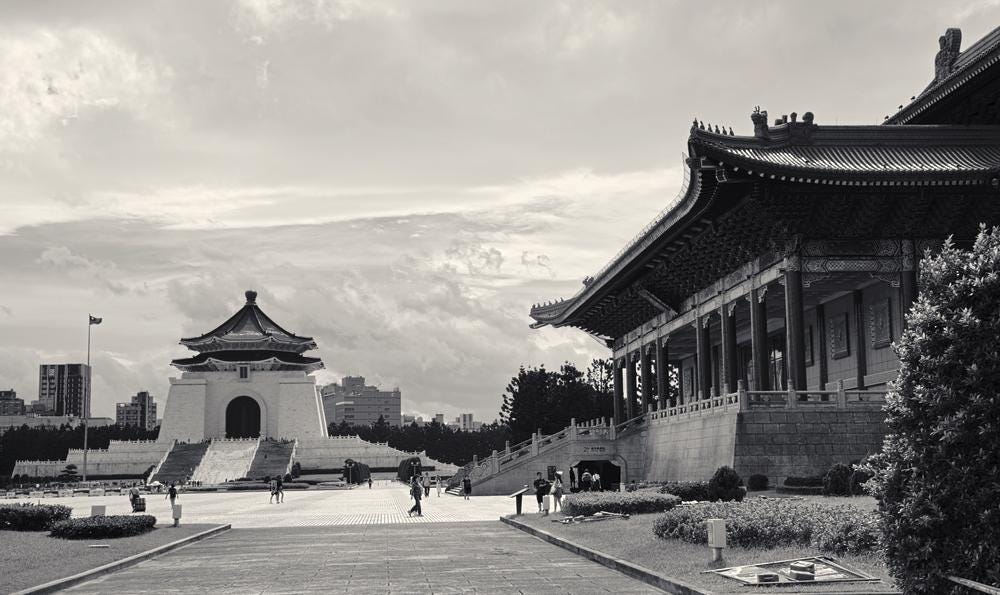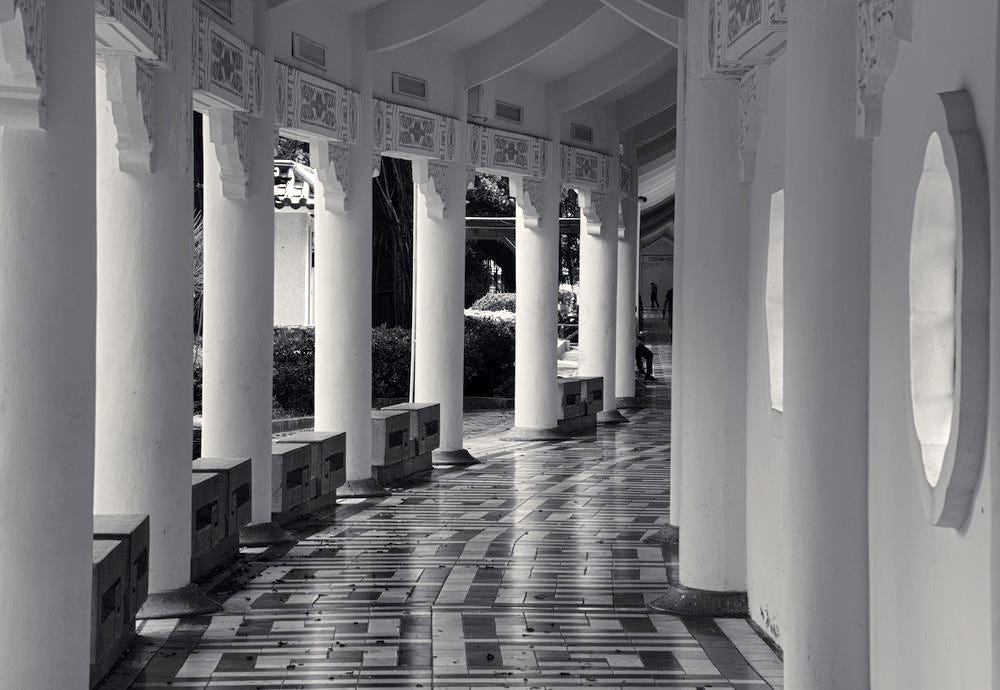Hello and welcome to the July issue of the Peripatetic Historian. I’m your host, Richard J. Goodrich, and once again we gather around the loom to weave history, travel, and photography into a coat of many colors.
This Month:
One Year in Taipei—A Retrospective
The Wind Dragons Stir
Ready? Let’s dive in:
Peripatetic Field Report: The One Year Retrospective
My first year in Taiwan (an academic year—our lives are still governed by a university calendar) has been fascinating, invigorating, sticky and sweltering. Glancing back over the past eleven installments of the Peripatetic Historian, I can little believe how much we have packed in—and that doesn’t count side trips to Japan and Hong Kong.
Most of my coverage focused on the big adventures; I’ve spilled little ink on the quieter routines that pack around the major jaunts like crumpled newspapers in a china box. It has long been my contention that expatriate life is no different, 90% of the time, than what a person experiences in their home country. We all sleep, eat, take showers, and perform our daily chores. Whether I am living in the United States, Palestine, or Taiwan, I still write, research, and read every day. I drag a consistent core of activities behind me, no matter where I park my desk.
But that final 10% slice—well that, is why I choose to live abroad. It is the enervating difference, the unique experiences that make the life of a peripatetic historian so fulfilling.
So, in the spirit of celebrating the 10%, I thought I would tie a ribbon around the first year in Taipei with a couple of observations about daily life—the commonplaces that are probably different from where you live.
The Daily Walk: Chiang Kai-shek Memorial Gardens
My peripatetic historian’s license stipulates that I cover at least four kilometers each day. (The requirements for the ‘sedentary historian,’ as you might imagine, are somewhat different). Although Taipei has several wonderful parks, the space around the Chiang Kai-shek Memorial earns my seal of approval.
The park contains four major attractions: a huge white pyramid that honors the former president, the National Theater, the National Concert Hall, and the Peace Arch. A blue-tiled portico covers three-quarters of the circumference, an elegant structure that offers shelter from the Plum Rains and the skin-scorching sun.
Depending on my mood, most days usually find me making one to three spins around the park’s perimeter. It is a wonderful place to walk and a fascinating encounter with Taiwanese culture. In the city center, Taipei residents live in apartment buildings; CKS is the communal backyard.
One always sees tai chi practitioners—whether alone or in large groups—as well as the more esoteric forms of the martial arts, like sword and staff forms. Musicians, of varying skill, practice beneath the portico. From drums to the reliably painful erhu, saxophones to the ocarina, music enlivens the route. The park owns a large, portable karaoke machine, which always attracts a circle of elderly users sharing their talents.
Then there are those who practice the quieter arts: Qigong masters contemplate the noble Banyan trees, elderly couples eat picnic lunches and pour tea from portable pots, old men square off for fierce duels across Chinese chess boards.
It is a place I find ever-charming, a wonderful walk, and definitely part of the 10% that makes it worth living here.
Politics: Taiwan style
Of course no matter where one flees it is difficult to outrun politics. Taiwan, like most countries, has its own version of the governmental soap opera. Here the fault line runs between the Kuomintang (conservative party) and the DPP (Democratic Progressive Party). The DPP holds the presidency at the moment while the KMT controls more votes in the legislature. This has led to popular unrest, a round of petitions, and the invocation of the Public Official’s Election and Recall Act. Twenty-four KMT legislators face recall. If successful, the DPP could take full control of the executive and legislative branches of the government. A vote on the targeted legislators is scheduled for later this summer.
That means it is time for all good politicians to hit the hustings. Campaign materials are already spreading, and one of the most innovative was this pack of tissues my charming wife was handed on a street corner:
According to Google translate, the text reads:
Go against evil
Come out and vote
I don’t agree with the recall
Very good legislator
Luo Zhiqiang
Presented with this example of electioneering, the obvious jokes bubble up like an overflowing cesspool:
Once again politicians trot out their tissues of lies.
There’s nothing like free tissues to help clean up the [expletive deleted] we’re about to hear.
Have a better joke? Drop it in the comments section below.
Book News
And here’s a brief commercial reminder: If you enjoy the stories you read in the Peripatetic Historian, you will probably also enjoy the extended content found in my recent books—Comet Madness and L.A. Birdmen.
Learn more at: https://richardjgoodrich.com/Books.html.
The Wind Dragons Stir
Sharp readers will recall that my earliest reports from Taiwan (Peripatetic Historian, Sept.-Nov. 2024) featured earthquakes and typhoons. A pair of rollicking temblors struck shortly after our arrival and three typhoons crossed the island before the season fizzled.
After months of stable soil, mid-June tossed a 6.4 earthquake at us. Like reluctant jelly we jiggled about for thirty seconds—and might I add that there is something truly disconcerting in the sound of concrete grinding in the walls—before the earth steadied.
Then, just to keep life interesting, the first Invest of the season popped up on my master weather console. “Invest” is meteorologist-speak for “investigative area,” a low pressure dimple in the atmosphere with the potential to develop into something more interesting. This particular invest bloomed in the vicinity of Yap, a small Pacific island group that rarely makes the international news. It slowly sidled west, strengthening and drifting toward Taiwan. As it took on a personality, it received a name, Wutip.
Ultimately it passed over the Philippines, reached typhoon strength (75 mph), and came aboard China near Hainan. Curving like a boomerang, it tracked up China’s interior before collapsing in rain showers and turbulent winds. Seventeen people were killed during the storm’s passage.
Wutip inaugurated the 2025 typhoon season. For some reason—namely that I had never bothered to look into the matter—I didn’t expect typhoons until August. As it happens, June typhoons are not unusual. Indeed, they have been recorded as early as May.
Nevertheless, I am thinking about taking a page from the Kinmen Island playbook and erecting a Wind Lion on my front balcony (see last month’s edition of the Peripatetic Historian).
Now I just need a heavy weight to keep the ground from frolicking…
Outro
By the time Substack drops this post into your inbox, I will be wheels down in the United States. It is going to be a compressed visit, with half the time dedicated to the cool breeze and sea salt of the Oregon coast. I hope to uncover a fresh historical angle for the August issue, and, failing that, I shall fill the post with starfish photography. Until then:
Be safe, be sensible, and I will see you next month.
Know someone interested in history, travel, or photography? Hit the share button and send them a copy of the Peripatetic Historian.
Thoughts? Comments? Political barbs? I have a button for that as well:









